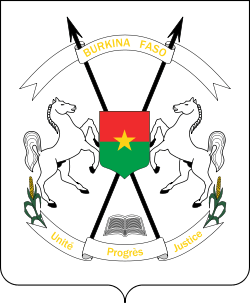Burkinabé general election, 2015
| | |||||
| |||||
|
| |||||
|
| |||||
| |||||
 |
| This article is part of a series on the politics and government of Burkina Faso |
|
|
Politics portal |
General elections will be held in Burkina Faso on 11 October 2015.[1]
Background
Following an amendment in 2000, the constitution limits presidents to two terms of five years. However, the restrictions were not applied retrospectively, allowing President Blaise Compaoré, who had been in office since 1987, to run for a further two terms, as he was re-elected in 2005 and 2010.[2]
On 30 October 2014 the National Assembly was scheduled to vote on a constitutional amendment that would scrap term limits. However, the vote sparked protests, with the National Assembly building, Ouagadougou City Hall and the Congress for Democracy and Progress headquarters set on fire. As a result of the protests, the vote was suspended.[2] Protests were also reported in other cities, including the second largest city Bobo Dioulasso.
Compaoré subsequently announced that he would withdraw the constitutional amendment.[3] On 31 October, Compaoré resigned and suggested the election should be held within 90 days.[4]
Armed Forces Chief of Staff General Honoré Traoré first assumed the role of acting head of state. However, many protesters criticised the new transition of power because of Traoré's ties to Compaoré. Some protesters have called for the election of Kouamé Lougué.[4] After a brief power struggle, the armed forces asserted that Yacouba Isaac Zida had their unanimous backing to be the interim head of state, although some protests continued against having a military-led interim administration.
Presidential candidates
The transitional charter barred any ministers in the transitional government from running for the presidency.[1]
Potential candidates
- Djibril Bassolé - former foreign minister[5]
- Kouamé Lougué - retired military General and former defense minister[4]
Campaign
In April 2015 the interim legislature passed an electoral code banning any MPs who supported the constitutional amendment that scrapped term limits.[6][7] In protest, the former ruling CDP and its allies announced on 10 April 2015 that they were suspending participation in the National Transition Council and the National Commission for Reconciliation and Reforms, saying the new electoral code was a means of political exclusion.[7]
References
- ↑ 1.0 1.1 Burkina Faso to hold presidential vote in October - interim government Reuters, 22 January 2015
- ↑ 2.0 2.1 Burkina Faso parliament set ablaze BBC News, 30 October 2014
- ↑ Burkina Faso president defies calls to step down BBC News, 31 October 2014
- ↑ 4.0 4.1 4.2 Burkina Faso unrest: President Blaise Compaore resigns BBC News, 31 October 2014
- ↑ "Djibrill Bassolé : "Oui, je vais annoncer ma candidature à la présidentielle"", Jeune Afrique, 9 April 2015 (French).
- ↑ "Burkina Faso blocks Compaore allies from elections", BBC News, 8 April 2015.
- ↑ 7.0 7.1 Benjamin Roger, "Burkina : le CDP et ses alliés suspendent leur participation à la transition", Jeune Afrique, 10 April 2015 (French).
| ||||||||||||||||||
_-_BFA_-_UNOCHA.svg.png)